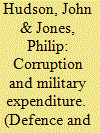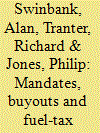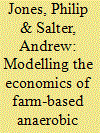|
|
|
Sort Order |
|
|
|
Items / Page
|
|
|
|
|
|
|
| Srl | Item |
| 1 |
ID:
084545


|
|
|
|
|
| Publication |
2008.
|
| Summary/Abstract |
We analyse the determinants of the number of military personnel, military expenditure and arms imports using a panel data of all available countries with data from 1984-2006. The number of military personnel increases with the extent of external threat and with conscription. There is evidence for both economies of scale and the existence of 'ghost soldiers'. Expenditure, given the number of military personnel, increases with the extent of internal threat and the area of the country. Arms imports increase with the extent of external threat, GDP per capita and corruption. Finally, both arms imports and military expenditure impact upon corruption.
|
|
|
|
|
|
|
|
|
|
|
|
|
|
|
|
| 2 |
ID:
103384


|
|
|
|
|
| Publication |
2011.
|
| Summary/Abstract |
Many governments mandate the blending of biofuels with fossil fuel supplies. The paper raises the possibility that some firms might choose not to respect such mandates, and cites the UK's experience, where a buyout of the obligation is possible. A simple economic framework is then used to explore some implications of mandate buyouts, including situations when buyouts and road-fuel-tax rebates are applied together. Finally, it discusses the design of buyout-mandate schemes that could release raw materials from biofuel production, following a future world food price shock.
|
|
|
|
|
|
|
|
|
|
|
|
|
|
|
|
| 3 |
ID:
125712


|
|
|
|
|
| Publication |
2013.
|
| Summary/Abstract |
Anaerobic digestion (AD) technologies convert organic wastes and crops into methane-rich biogas for heating, electricity generation and vehicle fuel. Farm-based AD has proliferated in some EU countries, driven by favourable policies promoting sustainable energy generation and GHG mitigation. Despite increased state support there are still few AD plants on UK farms leading to a lack of normative data on viability of AD in the whole-farm context. Farmers and lenders are therefore reluctant to fund AD projects and policy makers are hampered in their attempts to design policies that adequately support the industry. Existing AD studies and modelling tools do not adequately capture the farm context within which AD interacts. This paper demonstrates a whole-farm, optimisation modelling approach to assess the viability of AD in a more holistic way, accounting for such issues as: AD scale, synergies and conflicts with other farm enterprises, choice of feedstocks, digestate use and impact on farm Net Margin. This modelling approach demonstrates, for example, that: AD is complementary to dairy enterprises, but competes with arable enterprises for farm resources. Reduced nutrient purchases significantly improve Net Margin on arable farms, but AD scale is constrained by the capacity of farmland to absorb nutrients in AD digestate.
|
|
|
|
|
|
|
|
|
|
|
|
|
|
|
|
|
|
|
|
|